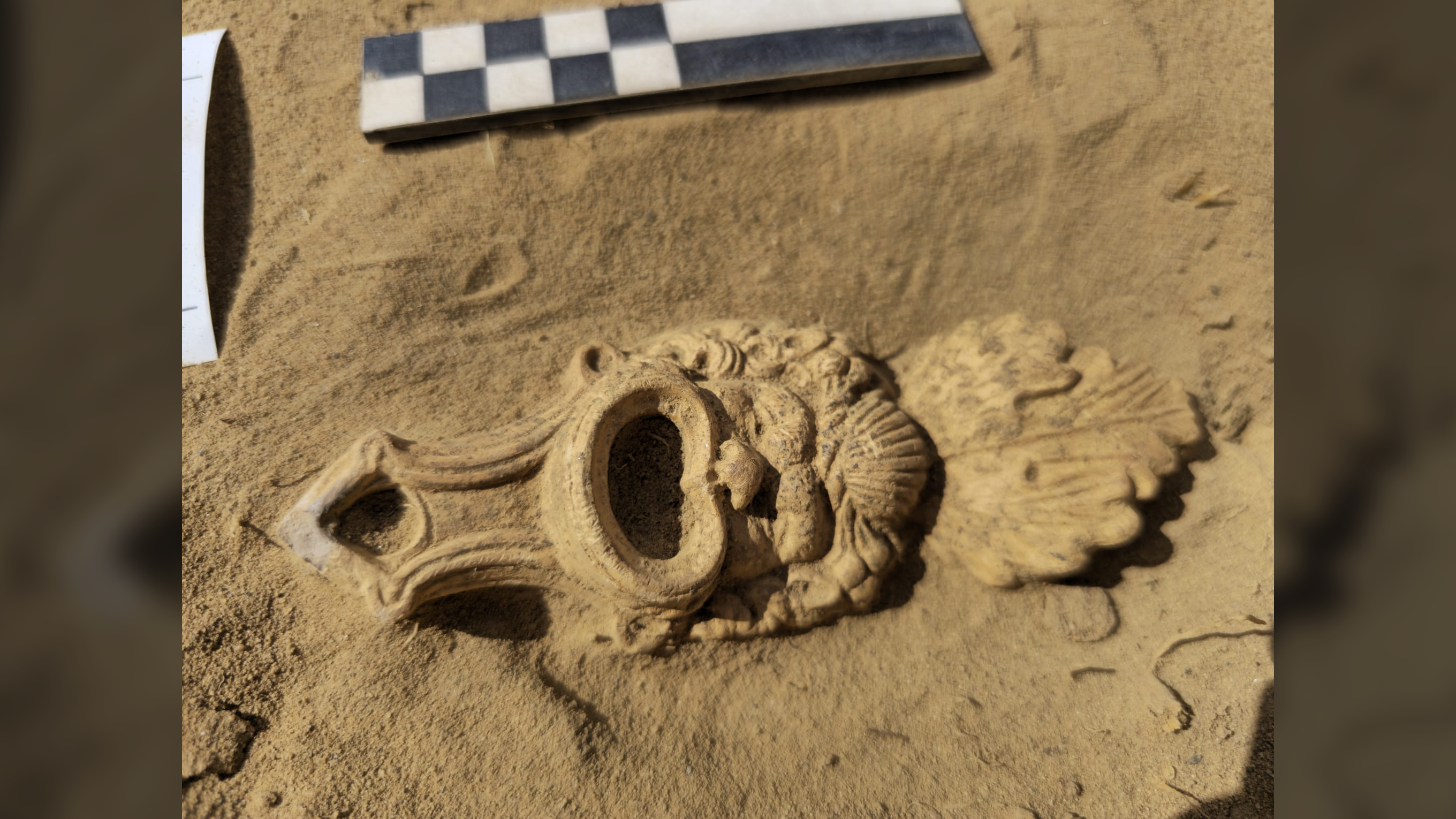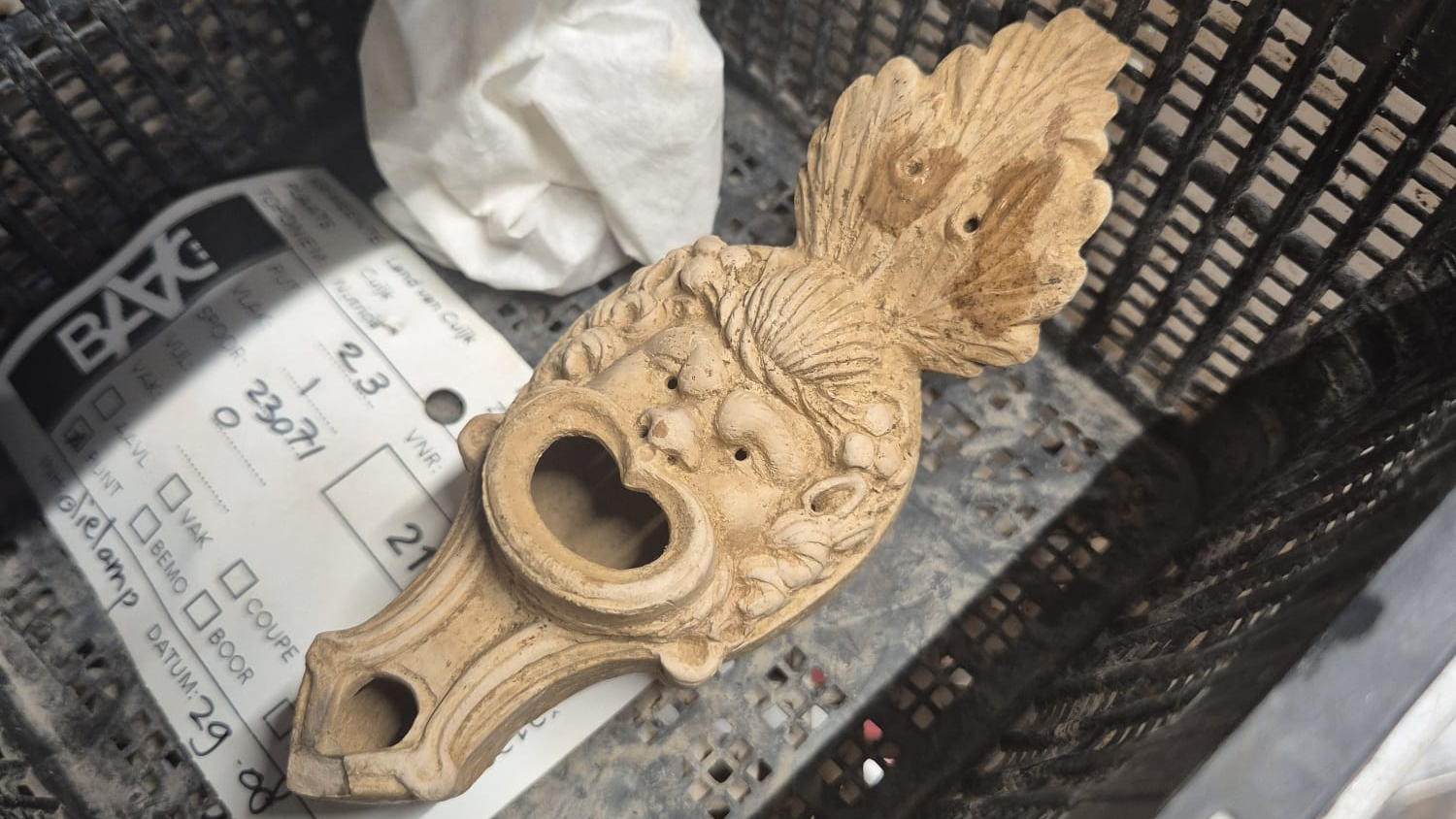1,900-year-old oil lamp that provided 'light in the journey to the afterlife' found in Roman cemetery in the Netherlands
Archaeologists excavating in a Roman cemetery in the Netherlands have uncovered a unique oil lamp dating to the second century A.D.

While excavating a massive Roman cemetery in the Netherlands, archaeologists discovered an unusual oil lamp that may depict the ancient god of wine.
The "filling hole," where oil would have been poured, looks like a comically large and open mouth on a person's face, while a handle above the face resembles a fancy leaf.
"Highly decorated lamps like this are very rare in this part of the Roman province, especially in this condition," Johan van Kampen, the archaeologist for the Land van Cuijk municipality, told Live Science in an email. "I dare not say this is the first of its kind in the Netherlands, but we are certain that the amount of these types of lamps are very rare."
Van Kampen and a team of archaeologists uncovered the lamp last month in their ongoing excavation of a Roman cemetery in the modern Dutch town of Cuijk, near the border with Germany. In Roman times — from about 50 B.C. to A.D. 400 — the town was known as Ceuclum, and it was inhabited by a Germanic tribe that Julius Caesar called the Batavi.
Today, most of the cemetery is covered by buildings and roads, van Kampen said, but it extends at least 15 acres (6 hectares). "The density of the graves is much higher than suspected," he said, "and we are expecting to recover 350 to 400 graves."
The archaeologists found the oil lamp in one of the roughly 70 graves they have already excavated. The lamp, which dates to the second century A.D., was discovered along with four ceramic plates, two jugs, a cup, a glass bowl and a bronze bowl, van Kampen said.
The dishes in the grave probably once contained food and drinks, according to van Kampen. "The lamp was part of this set and should be seen as an object providing light in the journey to the afterlife," he said.
Get the world’s most fascinating discoveries delivered straight to your inbox.

Related: Skull of bear held captive to fight Roman gladiators discovered near ancient amphitheater in Serbia
Archaeologists have cleaned the lamp but are still debating the meaning of the decoration. "Some think it might depict Bacchus," the ancient god of wine and debauchery, van Kampen said, but "it is probably an actor's mask."
Comedy and tragedy masks are a well-known symbol of the performing arts and go back to ancient Greece. Actors would wear the masks to emphasize their expressions and to change characters as needed. Masks were also associated with Bacchus (Dionysus or Dionysos in Greek mythology) — the god of wine and a patron of the theatrical arts — as his devotees often wore masks when worshipping him.
Only a fraction of the Ceuclum cemetery has been excavated so far. The archaeologists expect to find many more Roman artifacts — and likely even richer graves — as they excavate further.
Roman emperor quiz: Test your knowledge on the rulers of the ancient empire

Kristina Killgrove is a staff writer at Live Science with a focus on archaeology and paleoanthropology news. Her articles have also appeared in venues such as Forbes, Smithsonian, and Mental Floss. Kristina holds a Ph.D. in biological anthropology and an M.A. in classical archaeology from the University of North Carolina, as well as a B.A. in Latin from the University of Virginia, and she was formerly a university professor and researcher. She has received awards from the Society for American Archaeology and the American Anthropological Association for her science writing.
You must confirm your public display name before commenting
Please logout and then login again, you will then be prompted to enter your display name.
 Live Science Plus
Live Science Plus





